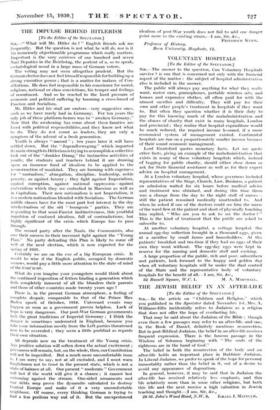THE IMPULSE BEHIND HITLERISM
[To the Editor of the SPECTATOR.]
Sin,—" What will Mr.. Hitler do ? " English friends ask me frequently. But the question is not what he will do, nor is it his immensely objectionable programme which really matters. Important is the very existence of one hundred and seven Nazi Deputies in the Reichstag, the portent of a, so to speak, eschatological mood in a.large mass of German voters.
The voting may not seem altogether prudent. But the German elector does not feel himself responsible for building up a strong executive power ; that is a matter for makers of Con- stitutions. He does feel responsible to his conscience for moral, religious, national or class convictions, his temper and feelings of resentment. And so he reacted to the hard pressure of economic and political suffering by booming a cross-breed of Fascism and Socialism.
Mr. Hitler and his staff are orators—very suggestive ones, such as we have rarely had in Germany. For ten years the only job of these platform-heroes was to " awaken Germany." Now that the awakening has come about these fanatics are faced with political responsibilities, and they know not what to do. They do not count as leaders, they are only a symptom of the advent of a fresh generation.
Youth is always " moved " ; ten years later it will have settled down. But the "Jugendbewegung" which imparted its main strength to IIitlerism is trying to accomplish a collective task out of the " dunkler Drang," the instinctive activities of youth; the students and teachers behind it are drawing upon an immense fund of idealism to be applied to the reconstruction of mankind. They are burning with eagerness far " mutualism," abnegation, discipline, leadership, noble poverty, as against luxury ; they fight against Imperialism, against corruption, against- national oppression—against materialism which they see embodied in Marxism as well as in Capitalism. Their new nationalism is not Imperialism, it is a modern nationalism blended with Socialism. The German middle classes have for the most part lost interest in the dry intellectualism of the old " bourgeois " parties. They are responding to that semi-Fascist instinctiveness, this youthful impulsion of Confused idealism, full of contradictions, but highly significant of the crisis which Europe has to pass through.
The second party after the Nazis, the Communists, also Owe their success to their incessant fight against the "Young Plan." No party defending this Plan is likely to come off well at the next election, which is now expected for the spring of 1931: Certainly we are on the eve of a big European crisis. It would be wise if the English public, occupied by domestic sorrows, would pay a little more attention to the state of mind of the Confinnt.
What do you imagine your youngsters would think about the continued imposition of fetters binding a generation which feels coMpletelY innocent of all the blunders their parents and those of other countries made twenty years ago ?
There is, in the present German atmosphere, a feeling of complete despair, comparable to that of the Prince Max Baden epoch of October, 1018. l'ntoward events may happen as soon as a government proves helpless. Lack of hope is very dangerous. Our post-War. German governments lack the great traditions of Imperial Germany ; I think the danger is sometimes underrated in England, because you take your information mostly from the Left parties threatened now to be overruled ; they seem a little purblind as regards their own situation.
All depends now on the treatment of the Young crisis. .1ny positive solution will soften down the actual excitement ; grievances will remain, but, on the whole, then, our Constitution will not be imperilled. But a much more uncomfortable issue 6,- I am sorry to say, not at all excluded, and I must warn Englishmen not to trust in the present state, which is not a state of balance at all. Our present " moderate " Government will last if the world will give it a chance ; it cannot last swimming against the stream. One-sided armaments and War debts may prove the dynamite calculated to destroy Central Europe and make of it a very uncomfortable neighbour. Of course, .every thinking German is trying to had a less perilous way out of it. But the unexperienced
idealism of post-War youth does not fail to add one danger point more to the existing strain.—I am, Sir, &c.,
IEDA IC
Bonn University, Ilaydnstr, 12.








































 Previous page
Previous page